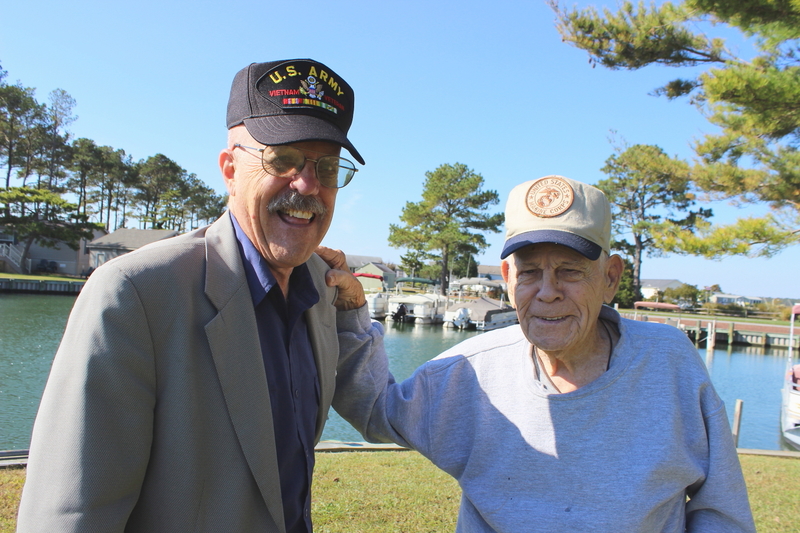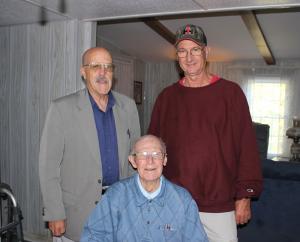Delaware Hospice staff and volunteers are grateful for the opportunity to serve U.S. veterans such as World War II veterans Bob Dickerson, a former sergeant in the Marine Corps, and Sam Smith, a former warrant officer in the U.S. Army and the Merchant Marine. Both men now reside in Sussex County, and both have found a helping hand through Delaware Hospice’s Transitions Program, which offers nonmedical support to individuals with serious illnesses who are not hospice appropriate.
Dickerson said, “I had never heard of Delaware Hospice until my wife was diagnosed with COPD. Her doctor informed us that with her limited lung capacity, she had a very short life expectancy. A friend suggested we call in Delaware Hospice to help keep her at home. They agreed to admit her, and then Delaware Hospice’s care team started coming in. The nurse, CNA, and social workers seemed to take care of everything. I couldn’t figure out where so many good people came from. I never saw anyone who wasn’t a very dedicated person.”
About the time Bob lost his wife, he had become eligible for the Transitions Program with his own declining health. His wife’s Delaware Hospice volunteer, Carrie, remained with him, visiting once a week, and he appreciated her friendship and help. “Carrie is such a lovely person. We go to the store every Wednesday and then have lunch. Afterwards, we return home and Carrie helps me put away and organize the groceries. I consider her a very close friend, and she will never leave without saying, ‘Bob, if you need anything, you just call me.'”
Dickerson grew up in Wilmington and was attending P.S. DuPont High School when war broke out. “I was so afraid that I wouldn’t get to serve that I went to Philadelphia during my senior year to enlist in the air corps. They said I was too small. As I went down the hall, the Marine recruiter called me in. He said that I appeared to be a little on the short side, but to come over to get measured. The requirement was 5-foot-6 and I was then 5-foot-5-and-a-half. So he stuck a pencil under my heels and said, ‘You’re in!’
“As the train pulled away from the Wilmington station in January 1943, I met other new Marine Corps recruits, all heading to Parris Island, S.C. A fellow next to me asked where I was from, and I said, ‘Wilmington, Delaware.’ He said, ‘Oh, you’re a square from Delaware.’ So for the next four years, I was known as Square.”
At boot camp, all recruits were given a test to determine where they would go. Most wanted to be in the infantry, scouts, and sniper school, because that’s what they had heard about. Bob said, “When I was preparing to take this test, the fellow next to me advised, ‘Square, get the best grade you can on this test, because it will determine what you’ll do the rest of the time you’re in the Marine Corps.' Upon leaving boot camp, I was sent to a new school for radar being organized by a physics professor.”
The Marine Corps decided they needed a regular Army type of coastal artillery, which meant 155-millimeter guns and radar similar to that of the Navy’s ships. Bob recalled, “They took 30 of us and said, ‘We’re going to make electrical engineers out of you in six weeks!’ We had very extensive schooling in an empty house at a seashore resort called Onslow Beach, N.C., and we had a test at the end of that time. We were told that the man with the highest score would get a master tech sergeant’s rating and would be in charge of everyone else. The next two high scores would get a sergeant’s rating. Well, you had never heard of a sergeant in the Marine Corps with much less than 30 years, but there I was - a sergeant after little more than a year of service!”
Dickerson became a radar technician and spent the rest of the war supporting the Marine Corps efforts to enhance its radar capabilities. His tour included Quantico, Aberdeen, San Francisco’s Treasure Island, Hawaii, and the South Pacific islands.
At the end of the war, Bob rotated back to the U.S. and finished his service at an ammunition depot in New Jersey as sergeant of the guard. Upon discharge, he returned to Wilmington, where he worked at, owned, and operated Huber’s Sporting Goods in downtown Wilmington for many years.
Sam Smith was a Delaware Hospice patient for awhile, but when his symptoms improved, he became appropriate for the nonmedical type of care available through the Transitions Program. Sam also appreciates weekly visits from his Delaware Hospice volunteer, Alice, which allows his caregiver to get a much-needed break.
Smith was drafted after high school in 1943 and trained at Norfolk, Va. He enjoyed his military training, but decided to study every day for his commission to be an officer. He was then assigned to an Army ship with a very unique mission at the time: to mine the coast for protection against submarines coming into the area. “We would travel up and down the coast selecting streams or inlets to the bay where a submarine could potentially enter the country. Our ship would go in, and the captain would tell us when to drop the mines. Each mine weighed about 300 pounds.
“We also used to pick up the ingredients for the mines. You would dock the ship, open it up, and shovel in the TNT. It was safe enough, because it needed a spark to explode,” Smith said.
There was one incident with an enemy submarine, however. “A German submarine attempted to come in off of Cape Hatteras, N.C., and they blew it up. The mines worked in one of two ways - if the ship hit it, it would explode, or someone on the shore monitoring vessels coming in could cause it to explode remotely when the ship was over the mine.”
Sam’s most frightening moments had nothing to do with handling live mines, though. He said, “One night there was a terrible storm and a ship out at sea was in trouble. So they asked us to go rescue these folks. Conditions were impossible and everyone was holding their breath - it was scary. But we managed to get a line on their vessel and bring them in to shore, eventually.”
After four years, Smith passed an examination for a license in the Merchant Marine. “In the Merchant Marine, I traveled quite a bit, especially in the South Pacific, doing the same line of work. We would evaluate the areas they wanted to mine, check out waterways, the depth of the water, whatever was needed so the mines would be effective.”
Sam still laughs to remember the day their ship was low on water supplies. “Our captain knew of a place on the Philippines where we could get water. Now this ship was 180 feet long, but believe it or not, he took it right up onto the shore between some trees! There we filled our tanks and then sailed away again. I’ll never forget that!”
Delaware Hospice’s Transitions Program was established as a free community service to help individuals coping with a serious illness but not hospice-appropriate to better face those challenges. Transitions clients benefit from visits and phone calls from Delaware Hospice’s Transitions coordinator and trained volunteers. They receive detailed information about available community services and suggestions on how to adjust to the new challenges in life. The Transitions Program is offered by Delaware Hospice at no cost to individuals and families coping with life-limiting illness. For more information about Delaware Hospice’s programs and services, call 302-856-7717 or visit www.delawarehospice.org.
























































